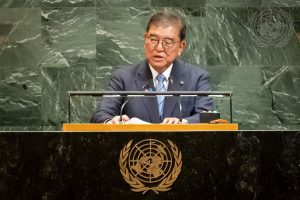On September 24, Ishiba Shigeru addressed the United Nations General Assembly. It was his last major foreign policy speech as Japanese prime minister – and arguably, it was his best.
During the speech, which lasted a little over 30 minutes, Ishiba struck a fine balance between articulating Japan’s own positions vis-à-vis the world’s most pressing challenges without being explicitly critical of Japan’s essential partners.
On U.N. reform, Ishiba did not mince words when he challenged the United Nations and the Security Council for dysfunction and anachronism. He called out the failure of the U.N. Security Council to respond to the most urgent global security crises, such as Russia’s invasion of Ukraine and the Israel-Hamas conflict in Gaza. In both cases, the U.N. is essentially watching on the sidelines as the situation deteriorates.
While acknowledging that the veto power granted to the Security Council’s current permanent members might have been a necessary “safety valve” that was meant to prevent an open clash among the major powers at the time, Ishiba did not hesitate to point out the recent abuse of the veto. He urgently called for the reform of the U.N. Security Council, to include expansion of both permanent and non-permanent members. Ishiba argued that such an expansion is only reasonable now that the number of U.N. member states has quadrupled since the United Nations was set up 80 years ago.
Similarly, even though he did not engage in direct name-calling, Ishiba did not hold back condemnation of Israel’s decision to expand its military operation in Gaza. He stressed how he felt “strongly indignant” about the “senior Israeli government official” who rejected the two-state solution for the Israel-Palestine conflict, while also challenging the Palestinian authorities to live up to their responsibility in their own governance when they are given the opportunity to do so. And as he articulated the pathway for Palestinians to join the international community, he broke ranks with the United States and declared that Japan’s debate over officially recognizing the Palestinian state is “not whether to recognize….but when.”
Ishiba also pressed hard for the revitalization of the effort toward nuclear disarmament. He argued that acquiescing to Russia’s nuclear intimidation and enabling North Korea’s nuclear program to continue are detrimental to confidence in extended nuclear deterrence in the short term, as well as to the cause of nuclear disarmament in the long run.
Ishiba cited a Japanese-style poem that was dedicated to the school children and teachers who perished when the atomic bomb was dropped on Hiroshima. He then argued forcefully that although no one can change the history of Hiroshima being the first city to be devastated by nuclear weapons, “whether Nagasaki will remain the last…depends on the continuous efforts and wisdom of mankind.”
Ishiba’s speech might not have been as visionary as the address by the late Abe Shinzo. It might not have had a succinct phrase that captures the essence of his argument, like his immediate predecessor Kishida Fumio’s mantra: “today’s Ukraine could be tomorrow’s East Asia.” Still, Ishiba’s last speech at the U.N. General Assembly gave a window through which one could look into his acute sense of urgency to uphold the existing liberal international order. He provided his own ideas about a set of pragmatic steps to regain peace and modernize the existing international framework to better reflect the reality of the world today, while keeping an eye on the collective aspirations on which the United Nations was established eight decades ago.
Now the question is whether that vision will continue under Ishiba’s successor, who will be selected through a vote within the ruling Liberal Democratic Party on October 4.





























